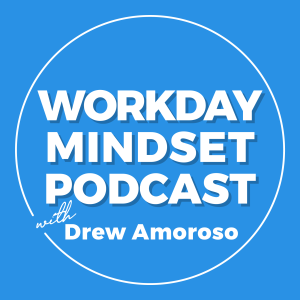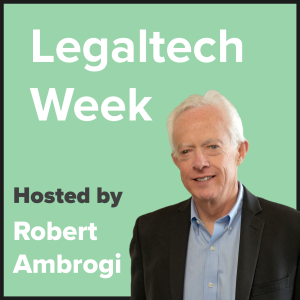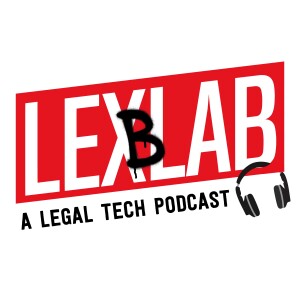

Episode List

An AI Arbitrator? The Latest Innovations from the American Arbitration Association, with CEO Bridget McCormack and CTO Diana Didia
Nearly two years ago on this podcast, we discussed the American Arbitration Association’s innovation initiatives – and specifically its embrace of generative AI – with Bridget Mary McCormack, who became its president and CEO in 2023 after having been chief justice of the Michigan Supreme Court, and Diana Didia, its chief information and innovation officer. On today’s episode, McCormack and Didia – now executive vice president and chief technology and innovation officer – return for an update on innovation at the AAA. In that prior podcast, McCormack and Didia spoke extensively about the AAA's innovation culture and their early experiments with gen AI. At the time, McCormack said that anyone who thinks they know where gen AI is going, even next week, is fooling themselves. While that may still be true, the AAA has certainly made some bold moves in that direction. Most notably, just a few days before we recorded this episode, the AAA announced something unprecedented in the dispute resolution world – an AI-powered arbitrator that it is launching in November. This is not just another AI tool to assist lawyers or arbitrators. This is an AI system that will evaluate case merits, generate recommendations, and prepare draft awards — with human arbitrators validating and signing off on final decisions before they are issued. In today’s conversation with host Bob Ambrogi, McCormack and Didia dive deep into how this AI arbitrator works, what it means for the future of dispute resolution, and how it fits into the AAA's broader innovation strategy as the organization approaches its 100th anniversary next year. They also explore the cultural transformation within the AAA that has enabled these technological advances and what is coming next in their AI-native vision for dispute resolution. Related episodes: On the latest LawNext: Sociologist Rebecca Sandefur on Enhancing Access to Justice. On LawNext: How A New Kind of Justice Worker Could Narrow the Justice Gap, with Nikole Nelson, CEO of Frontline Justice. On LawNext: CEO Nikole Nelson Returns with An Update on Frontline Justice’s Mission to Empower Justice Workers and Bridge the Justice Gap. Thank You To Our Sponsors This episode of LawNext is generously made possible by our sponsors. We appreciate their support and hope you will check them out. Paradigm, home to the practice management platforms PracticePanther, Bill4Time, MerusCase and LollyLaw; the e-payments platform Headnote; and the legal accounting software TrustBooks. Briefpoint, eliminating routine discovery response and request drafting tasks so you can focus on drafting what matters (or just make it home for dinner). Paxton, Rapidly conduct research, accelerate drafting, and analyze documents with Paxton. What do you need to get done today? If you enjoy listening to LawNext, please leave us a review wherever you listen to podcasts.

Justice Workers: Reimagining Access to Justice as Democracy Work, with Rebecca Sandefur and Matthew Burnett
With as many as 120 million legal problems going unresolved in America each year, traditional lawyer-centered approaches to access to justice have consistently failed to meet the scale of need. But what if the solution is not just about providing more legal services — what if it lies in fundamentally rethinking who can provide legal help? In today’s episode, host Bob Ambrogi is joined by two of the nation’s leading researchers on access to justice: Rebecca Sandefur, professor and director of the Sanford School of Social and Family Dynamics at Arizona State University and a faculty fellow at the American Bar Foundation, and Matthew Burnett, director of research and programs for the Access to Justice Research Initiative at the American Bar Foundation and an adjunct professor of law at Georgetown University Law Center. They argue that the access to justice crisis is actually a crisis of democracy. As cofounders of Frontline Justice, they have been pioneering research on "justice workers" — community members trained to help their neighbors navigate legal issues. Their recent article in the South Carolina Law Review, “Justice Work as Democracy Work: Reimagining Access to Justice as Democratization,” makes a provocative case: When people cannot access their own law, democracy itself fails. They present compelling evidence from Alaska, where nearly 200 community justice workers now serve over 40 rural communities, achieving a 1-to-25 return on investment while dramatically expanding legal aid's reach. In today’s conversation, Sandefur and Burnett discuss the mounting evidence for justice worker effectiveness, including research from the U.K. demonstrating that trained non-lawyers often outperform attorneys on specialized tasks. They also discuss recent breakthroughs — including unprecedented support from both the Conference of Chief Justices and the American Bar Association — and examine what obstacles remain. Sandefur and Burnett challenge the legal profession's monopoly on law, arguing that regulatory capture has estranged Americans from their own justice system. They envision justice workers as agents of democratization, expanding not just who can access legal help, but who can participate meaningfully in working democracy. Related episodes: On the latest LawNext: Sociologist Rebecca Sandefur on Enhancing Access to Justice. On LawNext: How A New Kind of Justice Worker Could Narrow the Justice Gap, with Nikole Nelson, CEO of Frontline Justice. On LawNext: CEO Nikole Nelson Returns with An Update on Frontline Justice’s Mission to Empower Justice Workers and Bridge the Justice Gap. Thank You To Our Sponsors This episode of LawNext is generously made possible by our sponsors. We appreciate their support and hope you will check them out. Paradigm, home to the practice management platforms PracticePanther, Bill4Time, MerusCase and LollyLaw; the e-payments platform Headnote; and the legal accounting software TrustBooks. Briefpoint, eliminating routine discovery response and request drafting tasks so you can focus on drafting what matters (or just make it home for dinner). Paxton, Rapidly conduct research, accelerate drafting, and analyze documents with Paxton. What do you need to get done today? If you enjoy listening to LawNext, please leave us a review wherever you listen to podcasts.

Leading Product Transformation Amid Company Transformation: 8am’s New Chief Product Officer Leslie Witt
As Leslie Witt took to the stage Sept. 3 to deliver the keynote at Kaleidoscope, 8am’s inaugural customer conference, it was the culmination of a whirlwind summer. It had been just four months since she had joined the company formerly known as AffiniPay as chief product officer, responsible for leading product transformation and strategy for established legal tech brands LawPay, MyCase, CASEpeer and Docketwise. In the intervening 16 weeks, the company had undergone a major rebrand and finalized details of its first major conference. Now, two weeks after the rebrand and as the conference got underway, Witt stood before the keynote audience detailing the company’s newest product initiatives, including its upcoming launch of its generative AI-driven 8AM IQ. Not long after Witt wrapped up her keynote, LawNext host Bob Ambrogi sat down with her live for this extended conversation. They spoke at the Kaleidoscope venue in Austin in a recording studio provided by 8am, where they discussed her background and career, her reasons for joining 8am, and the product announcements she had made earlier that day. Those announcements included the beta launch of an AI “Chat with Cases” feature that allows lawyers to ask questions of and search their case files, the integration of three core 8am products — LawPay, MyCase and SmartSpend — on a single technology platform, and more. Before joining 8am in May, Witt had more than two decades of experience in leading product teams. Most recently, she had served as the chief product and design officer at the mental health and wellness technology company Headspace. She previously held senior positions at Intuit, where she led global design, research and innovation initiatives focused on small businesses. Thank You To Our Sponsors This episode of LawNext is generously made possible by our sponsors. We appreciate their support and hope you will check them out. Paradigm, home to the practice management platforms PracticePanther, Bill4Time, MerusCase and LollyLaw; the e-payments platform Headnote; and the legal accounting software TrustBooks. Briefpoint, eliminating routine discovery response and request drafting tasks so you can focus on drafting what matters (or just make it home for dinner). Paxton, Rapidly conduct research, accelerate drafting, and analyze documents with Paxton. What do you need to get done today? If you enjoy listening to LawNext, please leave us a review wherever you listen to podcasts. Chapters 00:00 Introduction to 8AM and Leslie Witt 01:43 Leslie Witt's Background and Experience 09:53 Brand Transformation from Affinipay to 8AM 15:44 Product Design Philosophy and Customer Engagement 20:22 Platform Integration and New Features 24:57 Future Directions and Industry Impact

Ep 301: From Law Student Startup Founder to Global CEO: Daniel Lewis's Legal Tech Journey
Daniel Lewis has witnessed legal technology's evolution from multiple vantage points that few others can claim. As a Stanford law student in 2012, he and classmate Nik Reed co-founded the legal research startup Ravel Law with the audacious goal of taking on LexisNexis and Westlaw using machine learning and data analytics – at a time when such challengers were few and far between. Not only was Ravel Law pioneering in its own right, but it also spearheaded and funded the Caselaw Access Project, an ambitious partnership with Harvard Law School’s Library Innovation Lab to digitize and provide free and open access to every official court decision ever published in the United States. After Ravel's acquisition by LexisNexis in 2017, Lewis spent the next five years leading product teams within the legal research giant, including as vice president and general manager of its Practical Guidance and analytics products. This dual perspective – startup founder turned corporate executive – helped shape his understanding of what works and what doesn't when building technology for lawyers. Today, as CEO and global chief executive of LegalOn Technologies, Lewis leads a 600-person company that is tackling contract review with a fundamentally different approach. Rather than relying solely on tech-enabled services or raw AI that can hallucinate legal advice, LegalOn combines large language models with attorney-developed playbooks to help in-house legal teams achieve up to 85% time savings on contract review. The company just raised $50 million, for a total raise of $200 million across multiple funding rounds – which Lewis says makes it the most well-funded AI company focused on in-house contract review – and announced a strategic partnership with OpenAI to develop AI agents for legal workflows. In this wide-ranging conversation, Lewis shares hard-won insights about the realities of legal tech entrepreneurship, from the "deranged" confidence required to challenge industry giants as a law student to the leadership lessons learned managing teams through multiple business transformations. He discusses why the current moment represents the most significant opportunity for legal tech innovation in decades, how AI agents will reshape routine legal work, and what he's learned about building technology that lawyers don't just try once but actually integrate into their daily practices. Related episodes: From Ravel Cofounder to Knowable CEO, Nik Reed Has Learned that Building Quality AI for Legal Takes A Lot of Hard Work. On LawNext: The Inside Story of the Caselaw Access Project, with Three of the People Who Made It Happen. Thank You To Our Sponsors This episode of LawNext is generously made possible by our sponsors. We appreciate their support and hope you will check them out. Paradigm, home to the practice management platforms PracticePanther, Bill4Time, MerusCase and LollyLaw; the e-payments platform Headnote; and the legal accounting software TrustBooks. Briefpoint, eliminating routine discovery response and request drafting tasks so you can focus on drafting what matters (or just make it home for dinner). Paxton, Rapidly conduct research, accelerate drafting, and analyze documents with Paxton. What do you need to get done today? If you enjoy listening to LawNext, please leave us a review wherever you listen to podcasts.

Ep 300: Reveal’s CEO and CTO On Its Launch of Gen AI for E-Discovery Review
The e-discovery company Reveal Data recently announced that it will launch its new generative AI-powered document review platform, called “aji,” in late September. Notably, the company said it is offering full access to the platform at no cost through Dec. 31, in order to enable “the entire legal community to explore and master the next era in GenAI review innovation.” To discuss the launch of aji, today’s episode features Reveal’s founder and CEO Wendell Jisa, together with the company’s chief technology officer, Matthew Brothers-McGrew. This launch, Jisa says, represents the culmination of a deeply personal 30-year journey in legal tech from delivering photocopies in Chicago during blizzards to leading what he believes is one of the most significant technology companies in the legal industry. In their conversation with host Bob Ambrogi, Jisa and Brothers-McGrew make the case that generative AI presents the legal profession with the opportunity to become technology trailblazers rather than laggards. Their goal, they say, is to support the profession by democratizing access to AI across firms of all sizes and types. They also discuss Reveal’s recent launch of Reveal Private Deployment, an initiative to support customers in whatever way they want to deploy Reveal’s software, whether in the cloud, on-premises, or hybrid. At a time when other companies are pushing their customers away from on-premises deployments and into the cloud, Jisa and Brothers-McGrew say this is yet another way in which Reveal is seeking to democratize access by accommodating the interests of all its customers. Thank You To Our Sponsors This episode of LawNext is generously made possible by our sponsors. We appreciate their support and hope you will check them out. Paradigm, home to the practice management platforms PracticePanther, Bill4Time, MerusCase and LollyLaw; the e-payments platform Headnote; and the legal accounting software TrustBooks. Briefpoint, eliminating routine discovery response and request drafting tasks so you can focus on drafting what matters (or just make it home for dinner). Paxton, Rapidly conduct research, accelerate drafting, and analyze documents with Paxton. What do you need to get done today? If you enjoy listening to LawNext, please leave us a review wherever you listen to podcasts.
You may also like
Create Your Podcast In Minutes
- Full-featured podcast site
- Unlimited storage and bandwidth
- Comprehensive podcast stats
- Distribute to Apple Podcasts, Spotify, and more
- Make money with your podcast







